Monday, 03 March 2025
In theory we all love them: The small owner-driven shops that surprise us with their unusual selection or combination of goods and food made with love and care,
vibrant places with a special and welcoming atmosphere or homely places of peace where we can sit and wonder and get inspired.
Shops who's owners create a place from their ideas of a human world, who are ready for a chat if desired but not pushy in their
sales attitude. Places that are somehow home away from home, places for a rest or for inspiration. Places where we hopefully buy stuff since we're not forcibly persuaded by aggressive marketing.
And yes. There are these places, and it doesn't come as a surprise that many of these shops offer organic items.
Books and more
Imagine the dry fruit and sweets display of an oriental bazaar stall, and put it in the middle of a crammed book shop filled with mediavistic, orientalistic and cooking literature. When it's possible again sit down in front of the shop or at the single bar table inside and order oriental-style coffee, tea, and mezze. Have a chat with the owner and scroll the book shelves while you wait – you will find interesting media on medieval arts and crafts, food, biographies of historic persons, films, facts and fiction in German, English, and even French. Your meal – the air-fried falafel, perhaps a soup – will be fully organic as are the drinks and the home-made dried fruit.
Before the covid-19 pandemics Saladins Souk in Haidhausen was also a reliable source of sweets imported from Damaskus, and along-side earthen oil lamps and artisanally produced soaps from both, the Provence as well as the now sadly destroyed soap shops in Aleppo, you will find (usually conventional) delicatessen from French supermarkets. The shop (also dubbed Haidhauser Oase as the blackboards in front of it have it) can be found in the beautiful and relaxed so-called "French quarter" (due to the street names) a few minutes North-West from Ostbahnhof station. Be prepared to find an always changing display of (not always organic) delicatessen often brought by the owner from his travels or made by his friends.
A relaxed lunch and coffee spot before the covid-19 pandemics the shop never came to have reliable opening hours again, in fact I've rarely seen it open when passing along. But with spring 2025 arriving I spotted a new blackboard with opening hours in the shop window, so there's hope again!
Love to sit down with a good book and a glass of good wine? No question, the two are a perfect match, and even if you're more into an organic softdrink (Bionade), the Buchhandlung Lentner bookstore near Rosenheimer Platz with its cosy cafe is a place where you can stay for hours sitting, watching, chatting with the staff and reading. If you're not able to read German shop of their carefully selected wines, some of them organic. They will also order English books for you (send e-mail, phone in or use their webshop in advance), but this may sometimes take longer than the usual overnight order service for German books. Unfortunately, neither the coffee nor the milk are organic, but if you ask they'll perhaps offer it next time.
Closed
2025-03-03 10:30:00
[Munich, Haidhausen, organic, cafe, coffee, tea, deli, books, lunch, delivery, fashion, French, falafel, shopping, covid, corona]
[direct link · table of contents]

Tuesday, 10 September 2024
When I visited Kassel I didn't intend to shop clothes, so I did not do any upfront research in this direction. But then I passed two well-assorted organic fashion boutiques and decided to assemble a small post well aware of that there are most certainly more sustainable fashion shops in town which I do great injustice to by not mentioning them here.
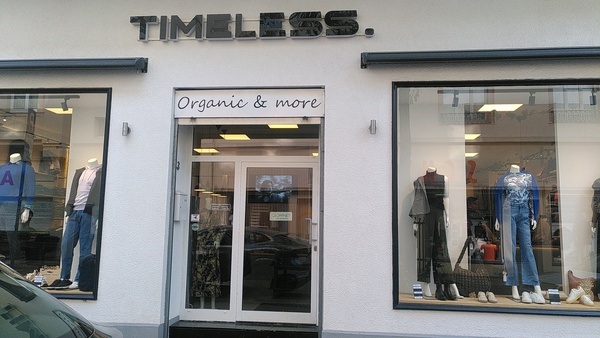
The first one is
Timeless, originally a skater's shop turned into an organic and fair streetware boutique offering a great selection of jeans and casual clothing for all sexes as well as a small assortment of hip, bike and travel bags and shoes. The predecessor of "Timeless" on this
location was the sister branch of the "Fresh Lollipop" store in
Göttingen.
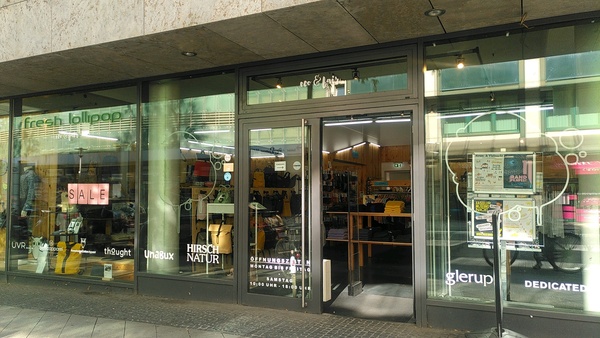
Fresh Lollipop's current location is just a few corners away and offers more versatile styles. In addition to clothing you also find sustainably and fairly produced fashion accessories from scarfs to bags.
2024-09-10 22:30:00
[Kassel, organic, fashion, shoes, fair, shopping, gifts]
[direct link · table of contents]

Friday, 06 September 2024
I may be biased but I find it easier to spot sustainable fashion boutiques in smaller cities with a university than elsewhere, and Göttingen is no exception.
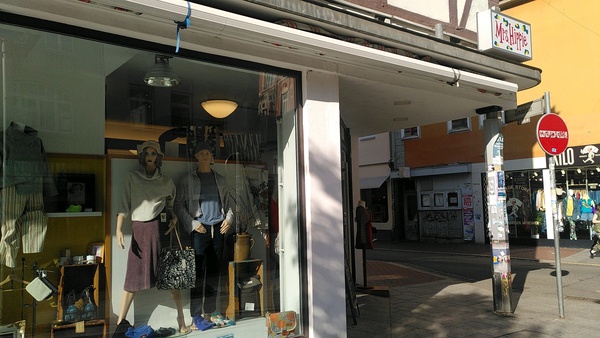
It's the only West-German city with a branch of the colourful
Mrs. Hippie chain (the other branches are in Dresden, Erfurt, Leipzig and Magdeburg). As the name suggests, colourful loose-fitting comfort fashion made from fibres of natural origin dominates the shop. The prices here are moderate, but to be affordable for smaller purses the shop makes compromises: While fabrics made from organic cotton or linen are available, there's also a lot of viscose (usually not made with the eco-friendly lyocell process). Recyclability (which would require mono-materials) is not in the focus (many pieces contain rayon/elastane), but sustainable production, preferably in Europe, definitely is.

If sustainable brands are important to you, you'll find a lot of both, established and less known brands at
Fresh Lollipop. All pieces here are fairly produced, both, with respect to the working conditions of the growers of natural fibres, the producers of the fabrics and the textile workers. The fabrics are either mono-materials, recycled and/or certified organic, to work into the direction of cradle-to-cradle processes. In the few cases where polymere mono-materials are used in washable textiles, only new PE and nylon is used to minimise microplastics abrasion in the washing machine. Apart from clothes and shoes for all sexes, bags, rucksacks and other accessories are being sold on two floors.
There's a second shop in Kassel.
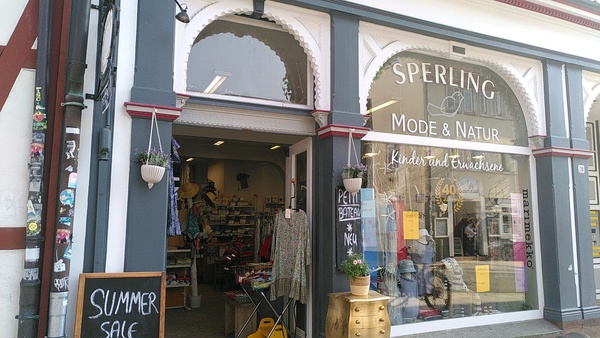
For organic clothes for babies, toddlers and younger children simply cross the street where you find
Sperling Mode & Natur. The crammed, yet cosy shop has a long history: It was established in 1983. It also sells a small selection for women and uni-sex accessories. If you come with smaller kids, there's a small table where they can draw and colour.
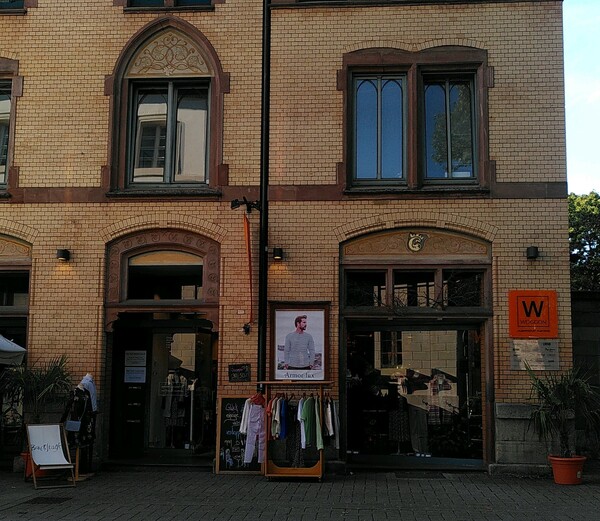
Whether you are generally prefering long-lasting artisanal (and as a consequence more expensive) clothing made from natural materials of highest quality or simply like to spend time in a carefully curated boutique for the distinguished bourgeois, take a break at
Woggon. Clothes, shoes, bags and other accessories are beautifully presented in a wood-and-brick showroom with a beautiful staircase, everything nicely arranged with carefully choosen details: a book here, a typewriter there. The service is impeccable, and as another customer exclaimed: "It's difficult not to buy a nice thing here." The shop also serves as a beautiful venue for concerts and readings.
Long-lasting clothes from natural fibres, often organic and often made from mono-materials can be found at the outlet of the Freiburg-based sustainable web and post order shop Waschbär – at least until October, 31st 2024 when the shop is going to be closed.
Fairly traded accessories and jewellery of beautiful and long lasting quality can also be obtained from the Contigo fair trade boutique.
2024-09-06 22:30:00
[Goettingen, Erfurt, Dresden, Leipzig, Magdeburg, organic, fashion, shoes, fair, shopping, gifts]
[direct link · table of contents]

Wednesday, 21 August 2024
Dresden's Wilhelminian neighbourhood of Neustadt is dominated by independent shops and venues, many of them run by female entrepreneurs as documented by an art project of local photographer Christine Starke. So it comes as little surprise that it is here where you have the best chance to discover a lot of gems, driven in accordance with the personal principles of the shop keeper which often include social and environmental aspects. Keep your eyes open, and you will discover a lot more than I have to suggest here.

Herbalists and beauty
The old town does not have much to offer in terms of independent and surprising shops, and the Altmarkt-Galerie mall is as boring as these shopping centres usually are. A notable exception is the Sonnentor shop directly located at the mall's entrance at Postplatz, next to the tram-stop at Wallstraße. Franchises of this Austrian producer of organic and fairly traded herbs, teas, condiments, bodycare products and spices are usually located in malls or main shopping areas, neatly designed heavens offering products that are good for both, you, and the farmers and producers involved when you're in the mood for shopping.
If you're on the outlook for herbs, remedies, bodycare and food items based on ingredients described by medieval healer nun Hildegard of Bingen pay a visit to the Marone herbalist shop on Bautzner Landstraße directly located at the east-bound tram stop Pulsnitzer Straße. Not all of the products on sale (which among others include chestnut products and a small selection of biodynamic wine) in this small specialist shop are certified organic though.

Leaving the tram tracks and entering the more pedestrian-friendly quartier natural and organic bodycare products can be found at the
Touch of Nature beauty parlour cum shop in Böhmische Straße east of Rothenburger Straße. Note that this shop is
closed on weekends.
Bicycles
A few steps from Touch of Nature there's a second hand bicycle shop cum workshop, Zwout! (formerly Elbcycles), where you can buy a used or recycled bike if you're staying longer, or get your own one fixed.

Jewellery
If you follow Böhmische Straße until it ends at Alaunstraße. A
luminous blue wall indicates the location of the Geldschneider & Co. steam-punk workshop. Among others you will find beautiful jewellery made from recycled parts of abandoned analog wrist watches. The place has somewhat erratic opening hours, so step by when nearby (if you need to plan ahead: Saturdays seem a safe bet). If closed during regular German shop opening hours you may call the phone number given on the entrance door – except during the Tollwood festival in Munich where the Geldschneider usually runs a booth.
Fair trade
As in many other German cities the first address for colourful gifts as well as organic sweets, spices and condiments are fair-trade shops founded as grassroots activities by Christian parish members in accordance with the conciliar process of mutual commitment (covenant) to justice, peace and the integrity of creation (JPIC). As the host for pioneering regional ecumenical plenums in 1989 and 1990 the city of Dresden has been playing an important role in this process. The spirit of this movement lives on in local fair trade initiatives like Quilombo which for almost 25 years had run a fair-trade shop in the entrance area of Dreikönigskirche in Hauptstraße which played host to the first democratically elected local parliament in Saxony after East Germany's peaceful implosion in 1989. Today the initiative still has a shop in the neighbourhood of Löbtau while their former place in the "Haus der Kirche" ("house of the church") has been converted into fair-trade
Cafe Dreikönig.
Sharing their roots with the Quilombo NGO the team of
Cafe Aha opposite Kreuzkirche runs a fair-trade shop in the heart of the city. It is located in the basement of the cafe and offers an impressive selection of fairly-traded gifts, body care and dry goods. This initiative also runs a fair-trade ...

Fashion
... boutique, Aha Naturtextilien, on Hauptstraße, offering a great selection of fairly traded fashion made from natural materials. Here you will also find a good selection of stationary, jewellery, eatable fair-trade goods and more. By the way: the name "Aha" is an abbreviation for "trade/act differently" ("anders handeln" in German), and implies a huge effort in not only selling fairly traded goods but offering fair conditions to their own employees.
Another centrally located fair-trade shop specializing in fashion and household accessories as well as coffee and chocolates is Contigo near the central train station.
For more ethically produced and sustainable cocooning items visit Tranquillo, a likewise colourful fashion-and-things boutique cum fashion label in the Neustadt neighbourhood, at the crossroad Louisenstraße/Rothenburger Straße. They produce their own women fashion entirely made from organic textiles focussing on basic colours – if you like Aha Naturtextilien don't miss this one. There's also a sustainable furniture outlet cum cafe on the other side of the train tracks to Neustadt trainstation.
If you like loose-fitting clothes, either unicolour or with colourful patterns head to the Dresden branch of
Mrs. Hippie. Their own brand is made in Poland, and all clothes are predominantly made from natural fibers, often organically certified, or rayon/viscose. However, they are not necessarily free of elastane.
Dresden's first fashion boutique exclusively selling fairly produced clothing from fairly traded, organically grown materials is dubbed
Populi and
can be found at the Western end of Louisenstraße, just before you reach the tram tracks of Königsbrücker Landstraße.
Both, streetware, denim and designer labels can be found here, for men and women. The interior of the shop is to a great deal made from upcycled furniture.
Students and nerds find fairly traded organic cotton t-shirts and sweaters with unique scientific prints at Unipolar, and everyone else organic streetware for both, men and women. This small, Dresden-based fashion label is the brain-child of a former physics student. The original store between the Bahnhof Mitte train station and the "Carl Maria von Weber" College of Music does no longer exist. (But if you already are here: the VG warehouse next to this old location has a well-assorted organic fashion section upstairs.)

As of 2024 Unipolar consists of two shops on both sides of Rothenburger Straße in the Neustadt neighbourhood, one selling clothing, and the other shoes and sustainable household gear. Finding the shops is easy: Simply spot the bath tub opposite the tram stop.
More colourful organic streetware, less nerdy prints, and open late on Fridays and Saturdays – that's
El Dorado Street Fair in Alaunstraße.

Before the arrival of noisy and cheap looking street food shops this street, the entrance to the Neustadt neighbourhood, was populated by numerous owner-run, carefully curated fashion boutiques and second-hand shops catering for a diverse crowd. Some of them have been surviving, and I'm more than happy that this shop venue, after the closing of El Dorado's predecessor, Invito, remained an organic fashion boutique.
Babies and toddlers
If you are on the look-out for beautiful, not overly sweet organic fashion for toddlers and smaller children or simply for beautiful organic garments step by Elvida in Louisenstraße approximately opposite Planwirtschaft pub and cafe. There you'll find the small flagship store of a Dresden-based sustainable kids fashion label – and a source for organic sewing things.
The following places shut down, so don't be mislead when you find references to them on the web:
- Quilombo, Haus der Kirche, Hauptstr. 23 (fair-trade)
- Baum&Wolle, Alaunstr. 13c (fashion)
- Ex Animo, Martin-Luther-Str. 17 (fashion and things)
- Hüpenthal Boutique, Bautzner Str. 63 (bespoke tailor, I miss your beautiful collars, r.i.p., Herr Hüpenthal!)
- Invito, Alaunstr. 20 (fashion, suceeded by El Dorado Street Fair)
- Lipfeins Lieblinge, Rothenburger Str. 1 (organic lipcare, factory outlet – their products can of course be obtained online or (e.g.) from one of the VG supermarkets)
- LouisdoOr, Louisenstr. 4 (sustainable toys and baby clothing)
- Tranquillo Outlet,
Louisenstr. 45 (organic fashion, visit them here)
- Unipolar Mitte, Jahnstr. 1
(streetware, visit them here)
- Un-Kraut, Martin-Luther-Pl. 12 (herbs and spices)
2024-08-21 17:30:00
[Dresden, Neustadt, shopping, organic, fair, fashion, shoes, spices, tea, herbs, delicatessen, gifts, upcycling, steampunk, bodycare, furniture, household, children, toys]
[direct link · table of contents]

Saturday, 01 June 2024
Traditional corner stores in general have been almost extinguished from the streets of Munich, surviving mainly in the form of immigrant grocery stores which unfortunately rarely stock organic items. However, there are a few survivers from the time when organic was an unknown word in supermarket chains: small supermarkets equipped with wooden shelves and as crammed to the brim as possible for orderly German souls. Usually they have everything you need for your daily life, just give you fewer choice between brands and varieties. Sometimes you'll find delicatessen the big players don't stock, and fresh produce is as fresh as from their competitors. Prices may be a few cents higher than the cheapest option in one of the retail chains, but you will be surprised to learn that many products actually are less expensive in a corner shop. In addition you may have a chat with the shop assistants, sometimes the owners themselves, and usually will be given a competent answer to questions you may have. Many of these shops have some tables and chairs where you can have a coffee, snack or vegetarian lunch.

Groceries
The (to my knowledge) oldest full retail organic neighbourhood shop in town, theLebascha in Haidhausen, was run collectively by a bunch of friendly women until they retired. The shop would have been lost for the neighbourhood if not the distributor had been tieing up strings with the community supported co-operative Ökoesel ("eco donkey" is derived from a pet name for bicycles – "Drahtesel" – as they started up as a bicycle delivery service) in Neuhausen. Since 9th of July, 2022 the base line of the shop has been financed by membership fees (depending on self-assessment), but Lebascha continues to be open for everyone: None-members simply pay (a usually low) market-price, members are entitled to discounts (usually between 12 and 20 percent). With its (conventional) liquorice shop-in-shop (to my knowledge offering the largest selection liquorice in town) the Lebascha also is a hot tip for aficionados. An assortment of loose-weight herbs and spices, and a basic range of loose-weight cereals, nuts, legumes and grains, detergents and soap make the Lebascha the only surviving zero-waste shop near Ostbahnhof. Note that it is closed on Wednesdays and does not accept cards, but members may chalk up and pay later.
A few corners away from tube stop Implerstraße in Sendling the neighbourhood grocery Hollerbusch ("elderbush") offers
vegan and vegetarian lunch as well as yoga, pilates or singing lessons in a backroom.
The shop is also a delivery hub for the Munich based community supported agriculture project Kartoffelkombinat and offers gravity bins to refill dry food and reduce package waste.
Immigrant shops and traditional corner stores
While these small supermarkets cater for all daily necessities including fresh fruits and veges there's no such thing as an all-organic immigrant grocery focussing on the latter and supplementing with a selection of dry goods and delicatessen from their owner's place of birth. The nearest you come is Giesinger Fruchtmarkt near tube-stop Kolumbusplatz. As about three quarters of the fruits and veges as well as most of the Italian delicatessen are conventional you have to carefully watch out for the bio keyword. Apart from organic greens they also offer organic choices for olive oil, wine, pasta and cheese.

A similar owner-run mini market, Varieta am Körner Eck, is located in the Glockenbach neighbourhood, on Auenstraße between the Reichenbach and the Cornelius bridges. The bakery items are all organic, and organic products in the self-service area are clearly marked "bio" on the shelf. The shop offers a lot of directly imported Italian dry food, but unfortunately none of it in organic quality. Also most of the fresh fruits and veges are conventionally produced.

Remember the tales of parents or grandparents about the corner shop they went to as children to buy a single sweet which the shop keeper would put down on a list for their parents to pay later on when they came to shop bread, milk, veges and all the ingredients for the home-cooked meal? The spirit of these shops from the past you may find left in some immigrant shops and this is the reason why I list the Viktualieneck in Bogenhausen in this section. I learned about this crammed greengrocer's shop opposing the newly build neighbourhood of Prinz-Eugen-Park on my quest for shops supporting package-free shopping, but when I went there it turned out a likeable traditional supermarket offering
fresh fruits and veges, regional delicatessen, bread and rolls, wine and all kinds of food. About half of it is organic, namely all the bakery products and certainly more than half of the pre-packaged food. Most of the fresh fruits and veges come from a conventional local market garden
– the turnaround for organic greens wasn't good enough among his customers, and his emphasis was on avoiding waste the shop keeper told me. Package-free shopping is possible for all fruits and veges as well as all items from the bakery, meat and cheese counter.
I cannot tell you whether the shop chalks up for trustworthy customers, but if you are in the vicinity support this shop instead of the supermarket chains nearby.

Delicatessen
The upmarket contrast to these somewhat shabby grocery stores is naturally to be found in the posh neighbourhood of the Lehel:
Studio Hindiba offers oils, herbs and condiments, olives, all types of rice, the famed ferments of Berlin's Markus Shimizu, a carefully selected range of wines and other predominantly organic delicatessen. For the smaller purse it may be just a beautyful shop to marvel at, but if your budget isn't painfully tight it's the perfect place to shop a foodie gift for someone special.

A few steps from Wiener Platz you'll find Steinbeißer, a cosy owner-driven deli advertising 'regional specialities'. Take this with a grain of salt – the organic Italian olive oil and Scandinavian candies (not organic) are small-scale produce specific to their region of origin, but certainly not from the greater Munich area. Most meat products come from small-scale Austrian farms which are likely to produce according to near-organic principles. Certified organic products unfortunately do not dominate the pleasantly arranged tables and shelves with artisanal products – predominantly foodstuffs and wine, but you may ask the owner about the provenance of his fare.

Wine, pepper and coffee from carefully selected small-scale producers, that's the focus of Grenzgänger ("border crosser"), a lovely shop directly located at the beautiful Bordeaux-Platz in Haidhausen, just opposite Café Reichshof. When you come here during the cold season you may find yourself welcomed by the warmth of a fireplace, and you can get a speciality coffee (14 types of Arabica to choose from) into your own mug. During covid-19 restrictions cream-ware cups aren't provided, so if you come without a mug you will be charged an extra 20 cent for a plastics-free one-way cup.
Unfortunately most of the products aren't certified organic, with the notable exception of the Demeter-certified honey and bee wax candles of a local beekeeper who is working in accordance with biodynamic principles, i.e. the gold standard for animal welfare.
Specializing in cheese and supplements – wine, olives, oil, herbs, condiments, to name a few – the Luigino's booth in the Southern part of Viktualienmarkt, opposite the crossing of Reichenbachstraße and Blumenstraße is the perfect place to shop for a picnic or the no-frills romantic candle light dinner. Once an almost entirely organic cheese booth the percentage of organic products on sale has diminished during the past years: mainly due to the advent of artisanal, yet conventional Italian cured meats, partially due to a lesser focus on organic labels on the selection of cheeses.
When ordering an Italian-style sandwich to take away you may wish to enquire about the ingredients and probably stick to the vegetarian ones since the Italian cured meat products usually are not organic.
The owner once run a delicatessen in Maxvorstand which was replaced by an organic ice-cream parlour in 2018.

Herbs and spices
Not exactly a spice bazaar, but a pleasant spice and herbs shop Gewürze der Welt ("spices of the world") had a long tradition on its former location in Thiereckstraße in the very city centre, but when the historic Ruffini house re-opened after a two-year period of restoration work in 2020, the shop moved back to its roots in the Sendlinger Straße (now) pedestrian area. As the name suggests you will find a world of spices, herbs, blends and condiments, a notable part of them in organic quality.
Munich's first organically certified herbalist is tucked away in a non-descript side road near Sendlinger-Tor-Platz, just a few steps aside the remnants of the Glockenbach neighbourhood's famous queer bars. Light and friendly the
Kräutergarten offers all kinds of organic dried herbs, spices, natural cosmetics and the like.
Sonnentor, the leading Austrian producer of organic herbs and spices, has a shop in Munich, too: Located in the basement of
Stachus-Passagen, a generally boring shopping mall a level above this central urban train and tube station, it's probably not the shop that you'll find by accident while taking a stroll through the city. Apart from herbs, spices and condiments they also have a selection of natural body care – an easy place to shop for a nice last-minute give-away.

Special shops
The only operating corn mill in Munich with its cosy mill shop is located in a small street a few steps from the tourist hotspots of Marienplatz and Hofbräuhaus. The Hofbräuhaus-Kunstmühle offers all types of flour, bruised grains, semolina, bran and cereals, predominantly of corn grown in the region. An increasing number of these artisanal products are organic, so watch out for the 'bio' keyword on the classic paper bags or the listings of the web shop. These products are also the base ingredients for the artisanal home bakery E. Knapp & R. Wenig next door where you can buy hand-made bread and rolls based on traditional, predominantly Munich recipes. The mill shop also stocks a selection of organic dried fruit, olive oil, raising agents and other baking ingredients as well as dry breads like South-Tyrolean Schüttelbrot.

Another very special mono-themed shop, Hanf – der etwas andere Bioladen, sells everything containing THC-free hemp: beer, lemonades, cookies, bars, tea, ice-cream, chocolates, body care, clothes, liquids, pet food and more. Although the name suggests it not all products are certified organic, especially not in the non-food range, but the sheer number of goods based on this versatile plant is quite impressive. The main shop (which is closed on Mondays) isn't located in the most inviting part of town but can easily be reached from Leuchtenbergring urban train stop. But wait: in 2019 a second one opened at a tourist-friendly location between Isartor and Marienplatz.
Ceased to exist
The following places shut down and were replaced by other, not organic ones. So don't be confused when you find references to them on the web:
2024-06-01 10:45:00
[Munich, Haidhausen, Schwabing, Lehel, Maxvorstadt, organic, lunch, snacks, coffee, supermarkets, deli, grocery, Italian, vegan, hemp, flour, mills, fashion, bodycare, spices, herbs, delicatessen, eatery, zero_waste, unverpackt]
[direct link · table of contents]






















